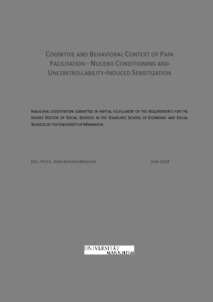|
Cognitive and behavioral context of pain facilitation : Nocebo conditioning and uncontrollability-induced sensitization
Bräscher, Anne-Kathrin
![[img]](https://madoc.bib.uni-mannheim.de/35272/1.hassmallThumbnailVersion/Dissertation_final_Druckauflagen.pdf)  Vorschau |
|
PDF (Dissertation)
Dissertation_final_Druckauflagen.pdf
- Angenommene Version
Download (2MB)
|
|
URL:
|
https://madoc.bib.uni-mannheim.de/35272
|
|
URN:
|
urn:nbn:de:bsz:180-madoc-352725
|
|
Dokumenttyp:
|
Dissertation
|
|
Erscheinungsjahr:
|
2014
|
|
Ort der Veröffentlichung:
|
Mannheim
|
|
Hochschule:
|
Universität Mannheim
|
|
Gutachter:
|
Hölzl, Rupert
|
|
Datum der mündl. Prüfung:
|
28 April 2014
|
|
Sprache der Veröffentlichung:
|
Englisch
|
|
Einrichtung:
|
Außerfakultäre Einrichtungen > Otto-Selz-Institut für Angewandte Psychologie (OSI)
Außerfakultäre Einrichtungen > GESS - CDSS (SOWI)
|
|
Fachgebiet:
|
150 Psychologie
|
|
Normierte Schlagwörter (SWD):
|
Klassische Konditionierung , Schmerz
|
|
Freie Schlagwörter (Deutsch):
|
Noceboeffekt , Schmerz , Unkontrollierbarkeit , Konditionierung
|
|
Freie Schlagwörter (Englisch):
|
nocebo effect , pain , uncontrollability , conditioning
|
|
Abstract:
|
Nocebo effects and uncontrollability are important psychological factors in pain facilitation and play a major role the context of acute and chronic pain. However, the precise mechanisms in both phenomena that lead to pain increase remain understudied. The general aim of the three studies contained in this thesis was to shed light on mechanisms of conditioning-induced nocebo effects and neuronal processes during uncontrollability-induced pain increase. For this purpose, experimental designs were employed that assessed the pain perception and its epiphenomena on multiple response channels (subjective verbal report, behavioral response, autonomic response, neuronal activity).
In the first study, a conditioning procedure was developed without additional verbal suggestions or employment of cues that are prone to induce expectations of pain relief or worsening. The results indicated that conditioning can induce a subjective nocebo effect, even when subjects are contingency unaware (implicit conditioning). The decay of this conditioned response over time was observable in subjective as well as behavioral measures. Neither state nor trait anxiety or measures of anxiety specifically related to pain showed a correlation with this nocebo effect in the subjectively non-painful range.
The second study adapted the conditioning procedure in order to induce nocebo-hyperalgesia. Further, the impact on autonomic measures was explored and relations between the nocebo response and personality traits were investigated. Nocebo-hyperalgesia as indicated by the subjective measure was successfully induced in part of the sample, independent from contingency awareness. Successfully conditioned subjects compared to non-successfully conditioned subjects showed to be habitually less anxious, received higher stimulus intensities despite comparable subjective sensation, and demonstrated increased heart rate and decreased HRV parameters. Motivational style and suggestibility were not related to the nocebo response.
Study three investigated neural correlates of uncontrollability-induced pain increase. During controllable pain trials, subjects showed temporal summation, but adapted during controllable warm trials, as indicated by the behavioral measure. During the uncontrollable pain condition, subjective intensity ratings increased over the course of the individual trials, despite subjects received the identical nociceptive input that they had regulated to feel constant in the controllable condition. The additional pain increase in the pain trials, induced by uncontrollability, was mirrored in increased activation of pain processing brain regions, such as thalamus, insula, SII, and ACC. Importantly, activity in perigenual ACC and PAG drove the uncontrollability-induced pain increase. These results suggest that the loss of control leads to activation of a pro-nociceptive circuitry also assumed to play a role in placebo and nocebo effects that involve the pain modulatory regions PAG and pACC.
In summary, these studies demonstrated a) the powerful impact of psychological factors, such as learning and uncontrollability, on pain perception, and b) proved the benefit of a multidimensional assessment of pain perception and its correlates. These results improve our understanding of pain facilitatory processes and have important implications for therapeutical interventions in pain conditions. They can further promote research in other fields, for example concerning the role of classical conditioning and neural processes in chronic pain.
|
 | Dieser Eintrag ist Teil der Universitätsbibliographie. |
 | Das Dokument wird vom Publikationsserver der Universitätsbibliothek Mannheim bereitgestellt. |
 Suche Autoren in Suche Autoren in
Sie haben einen Fehler gefunden? Teilen Sie uns Ihren Korrekturwunsch bitte hier mit: E-Mail
Actions (login required)
 |
Eintrag anzeigen |
|
